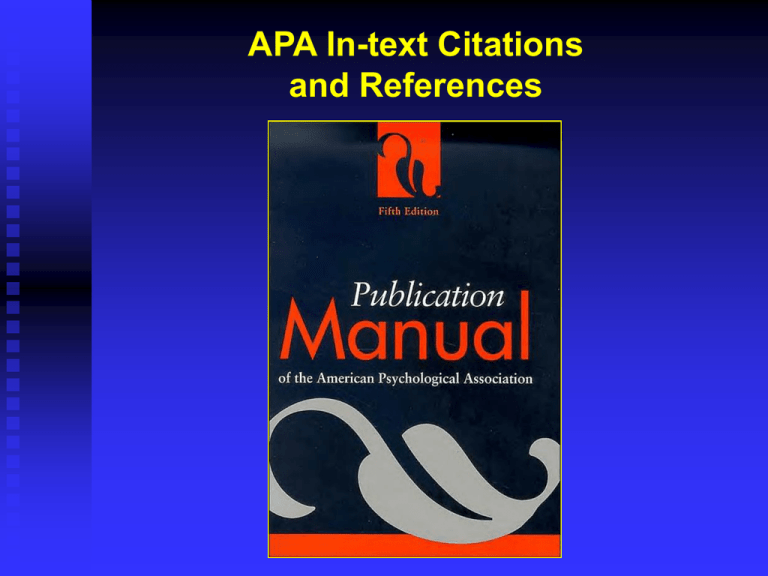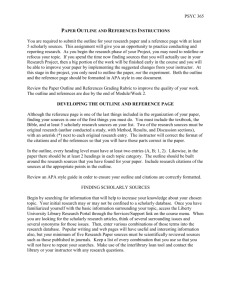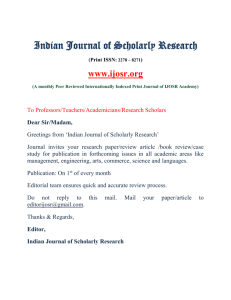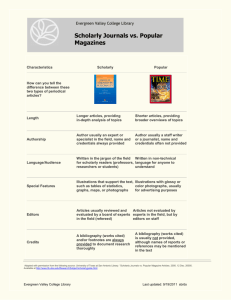Document
advertisement

APA In-text Citations and References Scholarly vs. Popular Media Definitions: Webster's defines "scholarly" as: 1) concerned with academic study, especially research, 2) exhibiting the methods and attitudes of a scholar, and 3) having the manner and appearance of a scholar." "Popular" means "fit for, or reflecting the taste and intelligence of the people at large." "Sensational" is defined as "arousing or intending to arouse strong curiosity, interest or reaction." Copyright © 1998-2003 by the Cornell University Library Scholarly Journals Scholarly journals generally have a serious look, and often contain graphs and charts Scholarly journals always cite their sources in the form of footnotes or references. The language of scholarly journals assumes some scholarly background on the part of the reader. The main purpose of a scholarly journal is to report on original research or experimentation. Copyright © 1998-2003 by the Cornell University Library Examples of Scholarly Journals Journal of Criminal Justice Punishment & Society The Prison Journal Criminal Justice and Behavior Crime and Delinquency Youth Violence and Juvenile Justice Criminal Justice Policy Review APA In-text Citations APA is referred to as the “Author, Date” format! Paraphrase or summary with author’s name in text: Give year of publication in parentheses immediately after the author’s name: Clemmer (1940), a pioneer in the field of prison research, argued that inmates assimilate into an inmate social structure and culture that condones deviant behavior. Paraphrase or summary without author’s name in text: Give the author and year of publication in parentheses at the end of the cited material: Researchers have traditionally focused on the importation and deprivation models of inmate misconduct (Huebner, 2003). Definition of a Paraphrase A paraphrase restates the information from a source, using your own words. Have approximately the same, or fewer words as the source Include all main points and important details in the source Use your own words, not those of the source Keep the same organization as the source Are objective and do not include your interpretation Paraphrasing Gleaning Inmates who are “gleaning” try to take advantage of prison programs to better themselves and improve their prospects for success after release. They use the resources at hand: libraries, correspondence courses, vocational training, schools. Paraphrasing Example “Gleaners” willingly participate in programs to rehabilitate themselves and enhance their success on parole. They participate in reading, educational programs, and vocational programs. APA In-text Citations Quotation with author’s/authors’ name(s) in text: Give year of publication in parentheses immediately after the author’s name, and put page number at the end of the quotation: According to Baumeister and Leary (1995), “threats to social attachments, especially dissolution of social bonds, are a primary source of negative affect” (p. 506). Quotation without author’s name in text: Give the author, year of publication and page number in parentheses at the end of the quote: Past research on the pains of imprisonment have indicated that inmates suffer from a “loss of liberty, loss of material possessions, and lack of autonomy” (Sykes, 1958, p. 108). APA References Pay particular attention to use of capitals & punctuation! 1. Reverse all author’s names and use initials, not first names 2. For more than one author, use commas and an ampersand (&) between names 3. Give date of publication in parentheses 4. Do not put quotation marks around the title of articles, do not underline the title of articles; capitalize only the first word of the article title, first word following colon (:) and proper nouns in the title of the article (this is referred to as “sentence style capitalization”) 5. Titles of periodicals are given “headline style” capitalization, all words are capitalized except for articles (a, an, the) and coordinating words (and, but, for, or nor) APA References 6. Titles of books and movies should be capitalized the same way titles of articles are (“sentence style capitalization”) 7. Italicize the title of books, movies and periodicals, do not underline them 8. Put a period after author’s initials, date, title of article, and at the end of the reference. If the reference ends in an Internet address, do not put a period at the end of the Internet address 9. Line 1 should be flush with the left margin, and subsequent lines should be indented (5) spaces (referred to as a “hanging indent”) 10. List should be alphabetized by author’s last names. Articles by the same author should be listed oldest to newest, in reverse chronological order APA Examples Downloaded scholarly journal article from the Internet: Klien, D. F. (1998). Controlling gang affiliations in prisons. Correctional Practitioner Quarterly, 12(5), 472-491. Retrieved October 30, 2001 from http://journals.aca.org/practices/vo12/98 Scholarly journal article (not downloaded): Smith, D. N. (1993). They have eyes but see not: Gender politics in New York. Psychology of Women Quarterly, 17, 515-535. Magazine article: Tarentino, Q. W. (1995, April). The hero of the day. Smithsonian, 26, 100-123. APA Examples Film (motion picture): Marvin, N. (Producer), & Darabont, F. (Director). (1994). The Shawshank redemption [Motion picture]. United States: Castle Rock Entertainment. In-text citation note for a motion picture: In the text of your paper you will give the name of the motion picture in italics followed by the name of the director, and the year it was produced in parentheses. Although The Shawshank Redemption (Darabont, 1994) is a fictional depiction of life in a maximum-security prison, it addresses a vast number of correctional issues from both the past and the present. APA Examples Book (specified edition): Clear, T. R., & Cole, G. F. (2003). American corrections (6th ed.). Belmont, CA: Wadsworth Publishing. Book (no edition): Bergner, D. (1999). God of the rodeo. NY: The Ballentine Publishing Group. In-text citation note when giving the name of the book: Give the name of the book in italics followed by the name of the author and the publication date in parentheses. God of the Rodeo (Bergner, 1999) is valuable to the field of corrections in that it shines a bright light on what goes on in the minds of serious offenders.





